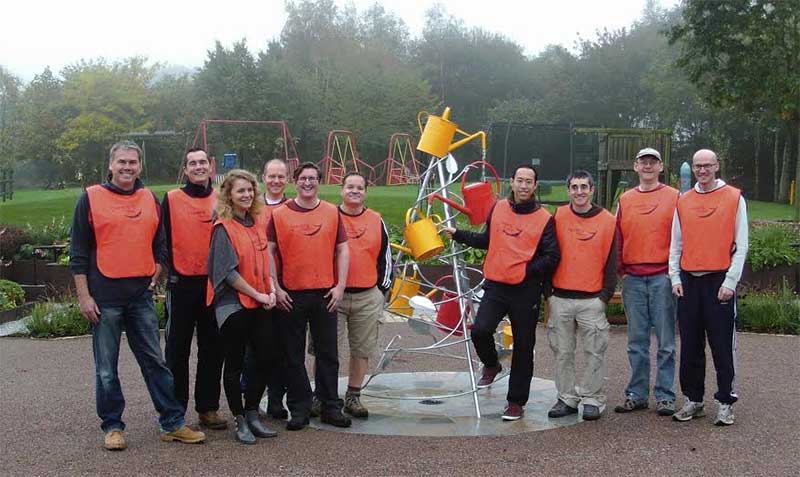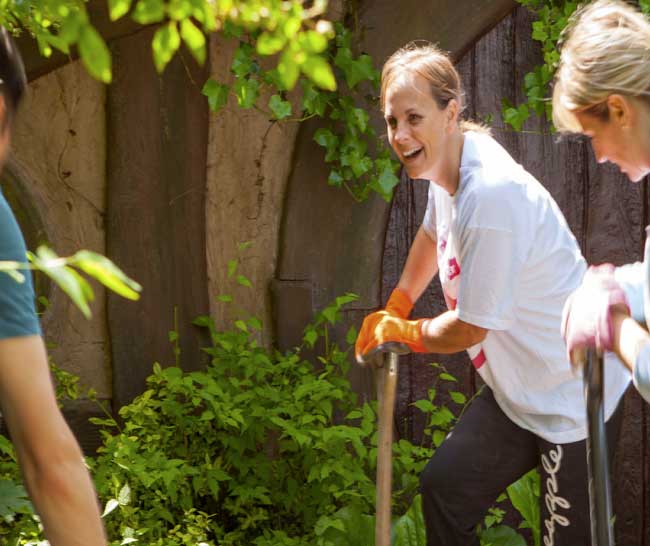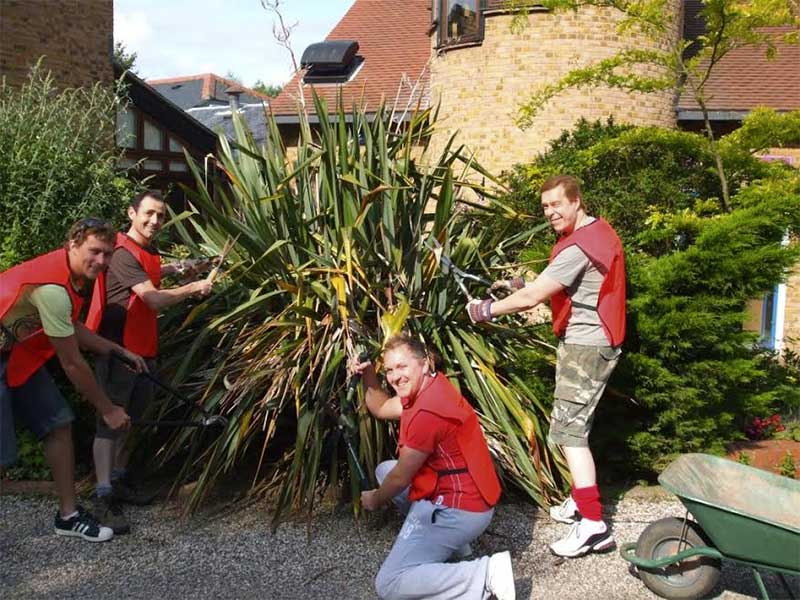The corporate team day – success is the stories not the shiny sheds
Last month I wrote a blog about the charity team-building day.
You know, those days where corporate teams volunteer to do physical volunteering for charities, including painting buildings and gardening as a way to improve their team working while ‘giving something back’. Nothing wrong with that, unless of course they paint buildings that don’t need painting or plant trees that don’t need planting, or do a rubbish job because they are skilled accountants, communications experts and marketers, not skilled decorators or gardeners.
Urban myth?
I hoped that you would tell me this was an urban myth but it would seem from your comments that many of you have experienced this type of dysfunctional charity and corporate relationship.
“Sadly true…I have had to fix a garden after a company made a mess of it before.”
“there is a huge naivety among companies about just how much help their volunteer groups are”
“Corporates often impose ideas on charities which feel obliged to accept their “kind offer”
“I though this madness was dying out.”Advertisement
Havens Hospices

Corporate volunteers at Havens Hospice. Photo: Havens Hospice
However, I did find one charity – Havens Hospices, who have embraced this volunteer approach as part of their long-term corporate engagement strategy with great success.
Over the years Havens Hospices have saved hundreds of thousands of pounds thanks to the work of volunteers. When recruiting volunteers they ask one fundamental question.
‘Is there genuine work to be done and does it save money for volunteers to do it?’
If the answer is no, then the offer of painting and gardening volunteering is rejected until it is needed, or the corporate volunteering team work with the corporate to find other mutually beneficial opportunities.
If the answer to the above question is yes, then Havens Hospices invite teams from local companies to volunteer as a team-building day; the most common volunteering tasks are gardening or painting. The typical corporate team profile; professionals who spend the majority of their workday sitting sedentary at their desk staring at a computer screen in a stressful and high-pressured environment that allows no permission or time for any meaningful interactions with the people around them.

Photo: Havens Hospice
They are not gardeners or decorators. They are office workers. Many of whom have never picked up a paintbrush or know one end of a plant from the other.
How they do it
It’s no wonder that when the teams arrive at the hospice they are anxious, they are way out of their comfort zones, they are not sure what their day will involve, they often don’t know each other well and they feel awkward and fearful because they are at a hospice and hospices are all about death (right?) and humans generally don’t like to think about death.
Tanya King and Lydia Plews, the corporate fundraisers at Havens Hospices work really hard to help the team feel comfortable and help them understand the many different services that their Hospices provide to individuals and families, many of which have more of an emphasis on living than dying. They put their minds at rest that they will not have to deal with death, bereavement or anything uncomfortable. The fundraising team also ensure the corporate team understands how their volunteering helps the hospice save money which can be invested in services, that make a big difference for individuals and families that the hospice helps.
The team spend the day completing their volunteering tasks, and as they focus on their painting and planting they begin to relax. They chat; many people have more conversation and learn more about each other in this non-pressured environment than they have in the last 10 years of sitting next to the same person. Informal and reflective conversations start to happen, and in this atmosphere, where people are focused on their task it becomes easier to share stories, personal stories about friends and family, and if anyone has had experiences of a hospice this is when those stories are told.
Diversional therapy for corporate teams
These are stories that don’t happen in a meeting, or even over a coffee because the situation and dynamic is different.
This is because these teams are experiencing diversional therapy, a form of therapy where physical activity supports peoples wellbeing, commonly used by the Havens Hospices care teams. The corporate fundraising team have taken this method of creating wellbeing and bringing people together through their physical volunteering programme for the benefit of corporate teams.
There is massive benefit for the corporate team who have now built up rapport, a greater sense of trust and have worked together to achieve something tangible, for example a landscaped garden, as well as something meaningful, because it is for the benefit of people who need the hospice.

Corporate volunteers at Havens Hospice. Photo: Havens Hospice
The more heavyweight the corporate, the heavier the volunteer task set and if the weather takes a turn for the worse, even better, according to Vanessa Longley, Director of Fundraising and Marketing at Havens Hospices, because it enhances the feelings of comradeship and achievement when the day is done.
But that’s not the whole story. The physical activity sends endorphins around the volunteers’ bodies. The endorphins make them feel good. All their senses are heightened. They are invigorated. They are feeling warm and loving, proud of all they have achieved that day. They are absolutely in the right physical and mental state to want to do something more – to be asked.
Happy corporate volunteers is the first step
When volunteers are feeling great, this, for Havens Hospices is the starting point for a strategic conversation, about other things they might like to do to help, for example by giving them something tangible to take away, like raffle tickets or leaflets about a dress down day and asking them to ask their colleagues friends and family to get involved. It is also the right moment to ask the question, ‘if your company would like to support us in other ways, who would be the right person to talk to – and could you make an introduction?’
The stories that people tell on the volunteering day are powerful stories that they take back to their colleagues, friends and families. They are the stories they tell when asking colleagues to buy raffle tickets or donate more on the next dress down Friday. They are the stories that inspire others to get involved.
[quote align=”center” color=”#999999″]Together let’s banish the dysfunctional charity team-building day forever[/quote]
The physical volunteering creates a win-win relationship. It gives corporate teams a great experience, challenges their assumptions that hospices are grim places associated only with death and inspires them (if done well), to help Havens Hospices fundraising team achieve their goal of creating long term mutually beneficial corporate partnerships.
“The opportunity to get our hands dirty was a nice break from the office norm, an opportunity to work closely as a team and to contribute something positive to a valuable cause”.
“If the work offered to us had been administrative the day wouldn’t have struck such a chord with the team in quite the same way, nor been quite such a challenge for people used to “driving a desk” for 10 hours a day.”
Feedback from the team at Lloyds.
Together let’s banish the dysfunctional charity team-building day forever. The next time a corporate approaches you with a team of enthusiastic shed painters and gardeners, take a strategic approach;
• be clear that the work needs doing – if not say no and find something else that is mutually beneficial
• plan carefully how you educate and inspire your volunteers, show them the difference they make
• use that physical activity to achieve a happy physical and emotional state for your volunteers
• when they are in the right state, ask them if they would like to support your charity in other ways.
Corporate income at Havens Hospices has more than doubled in the last five years since they took this strategic approach to their corporate volunteering days.
Thank you Vanessa Longley for sharing your wisdom and experience to inform this post.
Lucy Gower is a consultant, trainer and coach specialising in innovation and creative thinking to drive transformational results for individuals and organisations.
Main photo: painting a fence by Bronwyn Photo on Shutterstock.com



